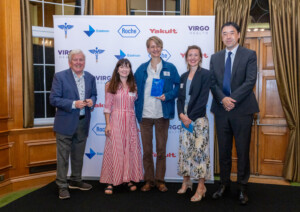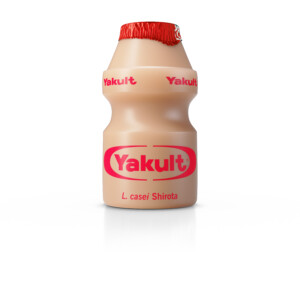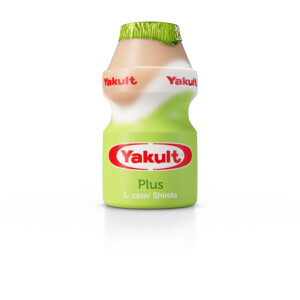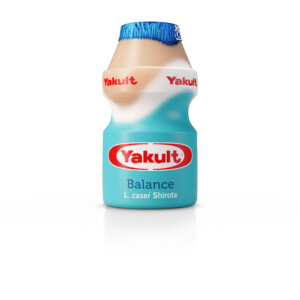

The Science Explained Award 2023. From left to right: Lawrence McGinty, Awards Host, Jules Bartl, Yvonne Bordon, Charlotte Stoddart (the winning team), Mr Hiroaki Yoshimura MD of sponsor Yakult
Yakult continued to sponsor the ‘Science Explained’ category in the 2023 MJA Awards. In 2023 the award was made to Charlotte Stoddart, Jules Bartl, Nigel Manington, Yvonne Bordon for a video made for Nature.com ‘The mystery of the disappearing lymphocytes’, the judges said: Delightfully clear and beautifully engaging explanation of an important but notoriously complex subject, brought to life with brilliant visualisation and compelling narrative. Successfully informs a wide audience on a complex issue many might think too difficult to explain to a layperson.

About Yakult
Yakult is a skimmed milk drink which was developed over 85 years ago by the Japanese scientist Dr Shirota. In the 1930s, he selected and cultivated L. casei Shirota, a unique strain of bacteria that is scientifically proven to reach the gut alive.
Every little bottle of Yakult contains 20 billion friendly L. casei Shirota. Around the world, more than 40 million Yakult products are consumed every day, in 40 countries and regions. There are three products available in the UK and Ireland: Yakult Original, Yakult Balance – enriched with vitamin D – which supports immunity and muscle & bone health – and vitamin E – and Yakult Plus – which is rich in vitamin C which supports the immune system and helps lower fatigue. It also contains fibre that can feed the bacteria in the gut.
All products are gluten free, fat free and suitable for vegetarians. For more information, please visit www.yakult.co.uk or find us on Facebook (@YakultUKIE) and Instagram (@Yakult_UKIreland).

Yakult and Science
Science is at the core of Yakult and its products.
Yakult is committed to continuing the work started by its founder, the scientist Dr Shirota, who spent many years investigating the application of microbiology and, of course, bacteria to positively influence the future. Yakult’s products and new developments are driven by scientific learnings, as was the case with Yakult Original, over 85 years ago.
Yakult keeps science at the core of its company through partnerships with external scientific and research institutions, but primarily through its own two scientific research centres:
The Yakult Central Institute in Tokyo which was founded by Dr Shirota in 1955 and has been operating ever since – and the Yakult Honsha European Research Centre for Microbiology in Ghent, Belgium, where hundreds of researchers and members of staff are focusing on various fields including microbiology, nutrition, biochemistry, bioengineering, pharmaceutical or cosmetic, with the purpose of helping us to better understand the gut and the many possible uses of live bacteria.
The Yakult’s mission is to contribute to the health and happiness of people around the world through the pursuit of excellence in life sciences, research and study in microorganisms.

If you would like more information please contact or visit www.yakult.co.uk.

